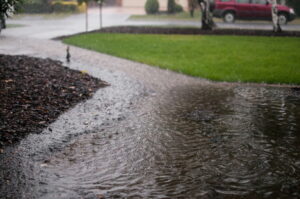As a Florida homeowner, have you experienced issues with your plumbing after torrential rain and heavy storms? You’re not alone. Plumbing problems are fairly common when our area is inundated with heavy rain.
When the rain pours down in Tampa, FL, your plumbing system is probably the farthest thing from your mind. But heavy rain can affect your plumbing if you’re not prepared, and don’t know what could go wrong. Let’s go over potential issues to be aware of and signs that heavy rains have warranted the need for plumbing repair.
Saturated Ground
A common plumbing issue due to heavy rain is broken pipes from the ground becoming oversaturated with water. When the ground becomes saturated from heavy rainfall, the soil starts to shift, providing less support for the pipes the ground encases.
As the ground shifts, it loosens rocks that weren’t mobile before. These can start to move toward your plumbing pipes which can cause damage. Saturated ground that starts to shift can lead to cracked and broken pipes, leaving areas for dirt and debris to enter which can then cause clogs.
If you notice water accumulation in multiple drains of your home, there could be a blockage in the plumbing system. Debris such as leaves, soil, trash, sticks, and grass might get into your sewer system and cause drain clogs, backing up the entire system.
Sewer Line Problems
When you’re faced with a deluge of rainfall, sewer line issues are common. After heavy rains, municipal sewers and private septic tanks can become overloaded with excess water. When there’s more water than they can take, the excess can start flowing backward and end up seeping into your home. Heavy rain can also push debris, mud, and the leaves in your gutters into drains that can’t cope and backups develop.
Sewage leaking into your home is a serious health and safety issue. You should turn off the water going to the drains throughout your home. Don’t attempt to use any water (including water-using appliances) and don’t flush toilets until repairs can be made by a professional plumber.
When you know a storm is on the way, check the outside drains for existing buildup and clogs. It’s essential to keep gutters and curbsides clean and free of debris so that it won’t accumulate in the outside areas that run into external drains.
Pipes Bursting and Cracking
If you notice that your home’s water is discolored and tastes coppery, or if you detect the scent of mildew in your home, this could be caused by a cracked or broken pipe. When rainwater accumulates and has nowhere to go, it can put enough pressure on pipes to cause them to crack or break–especially if your pipes are old. These cracks can let in soil and other contaminants, leading to discoloration, odd flavors, and unusual smells.
Finding a trustworthy plumber you can call any time of the day, 7 days a week is not always an easy process. Fortunately, we’re always ready to help homeowners get their plumbing back on track.
Contact Bayonet Plumbing, Heating & Air Conditioning to schedule plumbing service in Tampa, FL today!

